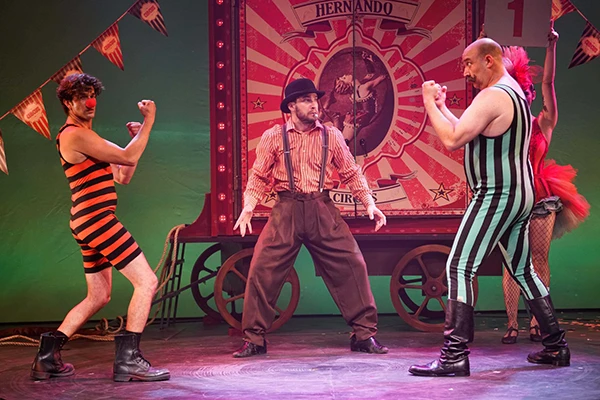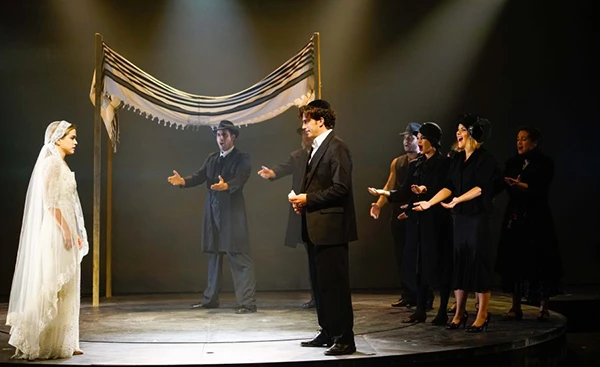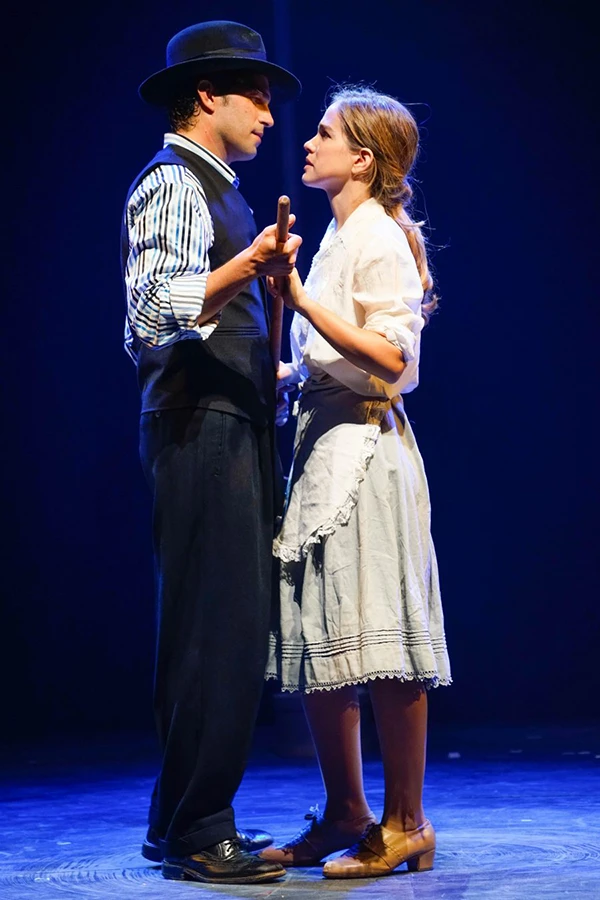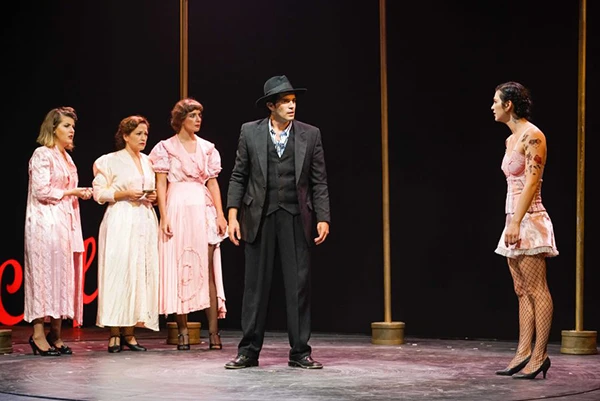When Sholem Asch Met Tarantino: Motke ganev Comes to Tel Aviv

THE SHOW, AS we know, must go on. But the night I saw the Beit Lessin Theatre’s King of Dogs (Melech ha-klavim), it had to be halted for a short while. Due to a technical problem, we were told, the turntable on stage had to be operated manually. And indeed, throughout the evening, whenever the revolve turned, two actors would kneel on all fours and toil to rotate the large wooden disk, laden with actors and props. While members of the ensemble seemed nervous about this mishap, I found it quite refreshing. This manual labor was almost Brechtian, drawing attention to what is usually effortless and invisible, and hindering immediate absorption in what was presented on stage. While this unintended nod to Brecht’s estrangement effect didn’t quite fulfill its subversive potential, it still felt like a welcome intervention in a sleek, professional show focused on romance and crime, good and evil.
The play’s melodramatic plot was fleshed out with attractive costumes, a dynamic set design, and songs by Leonard Cohen, performed cabaret-style by a female singer. Cohen’s songs add a North American flair to this adaptation of Sholem Asch’s renowned novel Motke ganev (Motke the Thief), but the Beit Lessin’s production hardly challenges Asch’s deadly-serious melodramatic tone. The acting style is in tendency realistic, except for the stylized violence (which seems to aggrandize, rather than subvert, its brutality), and the moody score enhances the dark atmosphere and befits its story of crime, promiscuity, and heartbreak.
Beit Lessin’s adaptation is well-suited to the novel on which it is based, which adheres to the rules of the melodramatic genre, constructing a black-and-white ethical universe, that, as Peter Brooks has shown, recreates and reaffirms hegemonic social order. Characters are typically punished for their attempts to cross social boundaries, and Motke, who strives to change his very identity as a criminal, suffers most. His efforts to be worthy of the chaste and angelic Khanele, romantic and heroic though they may be, are doomed.
Sensational content notwithstanding, the work’s style, aesthetic means, and ethical worldview are wholeheartedly conservative. Motke ganev presents human relations as inevitably harsh and even cruel. While the theatrical adaptation’s score universalizes and contemporizes Asch’s storyline, The King of Dogs remains within the moral and aesthetic world of this popular Yiddish author. The heartless binary power relations that govern the lives of men and women, rich and poor, exploiter and exploited, are presented in The King of Dogs, like in Motke ganev, as the natural order. Even the admirable puppeteer performing the role of Motke’s best friend, Burek the dog, feels like an entertaining circus-like shtik, rather than a Brechtian gesture that may “break the fourth wall” and help audiences consider the power mechanisms at work.
When it was published in 1916, Motke ganev challenged conventional images of Jewish life in the traditional, pre-WWI shtetl and in Jewish Warsaw. Resisting the heritage of Di klasiker (the classics) who, as Dan Miron has shown, mythologized the shtetl as a tiny, exiled Jerusalem, Asch located his novel in Warsaw’s Jewish underworld of brothels and murky cafes, prostitutes and gangsters, extortion and murder. Such portrayals of Eastern European Jewish life were in great demand in the early twentieth century, and not only among Yiddish-speaking Jews. Asch likely conceived Motke ganev as a best-seller, as evidenced by the novel’s serialization in New York’s Forverts and the popular Warsaw daily, Haynt.

Asch earned worldwide notice in 1907, when his scandalous play Got fun nekome (God of Vengeance) was performed in Max Reinhardt’s Deutsches Theatre, and in many other venues and languages over the following decades. Got fun nekome’s unholy mixture of Jewish piety and sexuality attracted audiences and controversy, especially in New York, so much so that Asch later withdrew it from public performance. Conservative outrage didn’t turn Asch away from such topics and plots. Quite the contrary: Motke ganev, adapted for the stage in 1922, reiterates many of the themes and motifs of Got fun nekome. In both we find Jewish parents striving to wash their hands of the crimes they commit and enable. “Gelt shtinkt nit” (money doesn’t smell), says the brothel’s owner to his wife, upon accepting Motke’s offer to marry their daughter Khanele, as it will keep her away from their unholy business.
Motke ganev’s unusual combination of yidishkayt, sex, and violence was popular among Jews in Eastern Europe, Palestine, and the United States. They, like Asch himself, enjoyed peeping into this realm of the impermissible, this (limited) rebellion against a stifling, conservative environment.
Yet would this juxtaposition of the chaste and the promiscuous, the sacred and sinner, the outlaw and the normative, mean the same for people in twenty-first-century liberal Tel Aviv? The appeal of Beit Lessin’s adaptation seems to lie less in its Jewish setting than in its use of melodramatic formulas, Asch’s sensational elements, and the stylized—and quite explicit—scenes of sex and violence. Playwright Yoav Shutan-Goshen told me that to his great surprise, he discovered “Tarantino” in this Yiddish novel (which he read in Hebrew translation). This is code, I assume, for action, violence, and box office success.
For Shutan-Goshen, as for other Israelis of his generation, The King of Dogs works despite rather than because of its Eastern European Jewish setting. For most people his age, that milieu is foreign, obsolete, and unattractive, and he and director Irad Rubinshtein felt they had to deemphasize this background, beginning with its title. For contemporary Israelis, Motke the Thief is strongly marked as Ashkenazi and thus old-fashioned. Motke is a good name for a successful Israeli web-portal for elderly people. It is less suitable for Beit Lessin which, like other theatres in Israel, struggles to attract younger audiences, offers discounted tickets for anyone under thirty-five, and recruits performers who are rising TV stars.1 Efforts to contemporize the work extend to describing it as “a new Israeli play.” Sholem Asch is acknowledged as the author, but Rubinstein and Shutan-Goshen are credited as dramatists, removing the performance one more step from its original context.2 The Leonard Cohen score, should, of course also be understood as means of subduing the play’s Yiddish origins.

So why base a play on Sholem Asch at all? Why modernize, universalize, and Israel-ize a Yiddish play? After all, the Beit Lessin Theatre is known (and occasionally criticized) for its emphasis on contemporary Israeli works, and for its attempts at universal appeal. The answer may be summarized in three words: “Cherchez la femme!” In this case, the woman is Tzippi Pines, Beit Lessin’s art director since 1993.
Born Fayge Yozefovich in Siberia in 1944 to parents who were Holocaust survivors, Pines arrived in Israel at the age of five, speaks and reads Yiddish, and retains an affection for Yiddish culture. She proudly informed me that staging Sholem Asch was her idea, and that she was planning to produced more plays based on Yiddish literature, such as Sholem Aleichem’s Blondzhende shtern (Wandering Stars). The King of Dogs is a shidekh as odd as the one between Motke and Khanele. Its constituents are the seventy-three-year old Pines—Beit Lessin’s supreme ruler—and the thirty-seven-year old Shutan-Goshen and Rubinshtein, who realize her vision while framing it in terms of Leonard Cohen and Quentin Tarantino. The result is distinctively Israeli. The young and handsome Shlomi Tapiaro does well playing Motke as a virile gangster, but is less impressive as Motke the poor young orphan, and as a defeated hero. Is this related to a reluctance to transform Motke into a weak, exilic Jew? That said, Tom Chagai, who normally plays the role, may better handle the challenge of Motke’s character development.

In the months since its premiere in September 2017, The King of Dogs has proved a box-office and critical success. Yet although it garnered ten nominations at the prestigious (and controversial) Israeli Theatre Awards, it walked away with only three: Best Director (Irad Rubinstein), Promising Actor (Ofri Biterman) and Best Set Design (Svetlana Berger). Audience responses posted on the Beit Lessin website and Facebook page pronounce the play fascinating, powerful, and exciting, and praise its set design, music, costumes, and “modern feel.” One viewer described it as watching theatre, circus and a musical performance all in one. Only one person protested “I don’t understand why they chose to sing in English in a play on Polish Jews,” and I suspect that Beit Lessin chose to post this critical comment because, paradoxically, it presents the show as contemporary and daring.

What troubled me were not the English-language songs in a play about Polish Jews. Rather, Leonard Cohen was not enough to make the play relevant today, a century after the novel’s appearance, in a country facing so many social and political tensions. The show was dynamic and entertaining, and included some charming moments, especially one in which Motke’s “girls” have a tea party and fantasize about husbands and the respectable, bourgeois life that they will never have. In this, I found myself sympathizing with the old-time critics of Yiddish theatre, who were always bemoaning the Yiddish audience’s proclivity for banal plots and melodramatic tear-jerkers. I’ve never subscribed to the Asch rehabilitation project, and re-reading his novel did not change my mind. Watching The King of Dogs, like reading Motke ganev, made me pine for Isaac Babel’s Odessa Stories (Odesskie rasskazy, 1931).
Babel’s magnificent portrayal of the Eastern European Jewish underworld was the source for an unforgettable 1996 adaptation by the Israeli Gesher Theatre, described by the London Guardian as “The Threepenny Opera meets Fiddler on the Roof.” Babel’s masterful irony and humor situate him far from the sensational and didactic world of the melodrama, to which both Motke ganev and The King of Dogs belong. When Babel’s famous gangster Benya Krik falls for the chaste daughter of a respectable Jewish balebos (middle-class man) he gets her by promising her father, first, a gravestone of pink marble at the Jewish cemetery, second, that he will leave his gangster profession, and, third, that he will kill all the father’s business competitors. Just as Asch’s verbosity and seriousness made me miss Babel’s terse, sardonic, and yet utterly warm evocation of the Jewish underworld, so did Beit Lessin’s sleek show make me long for a more biting and inspiring interpretation of Asch’s sensational novel. A manual revolve and a clever use of puppeteering are good starts; a score by Psoy Korolenko and Daniel Kahn would make things even better.